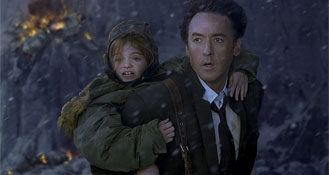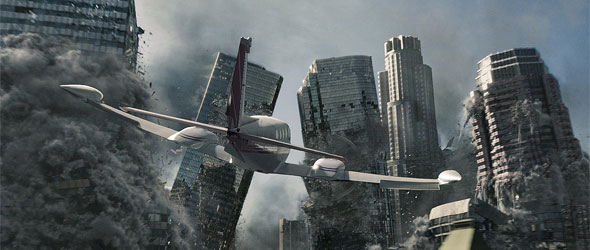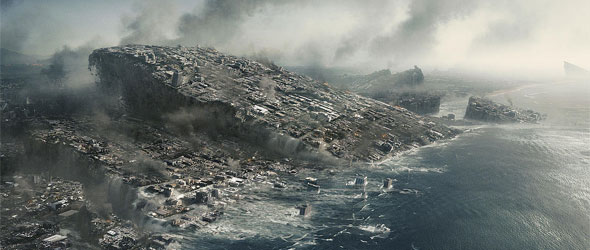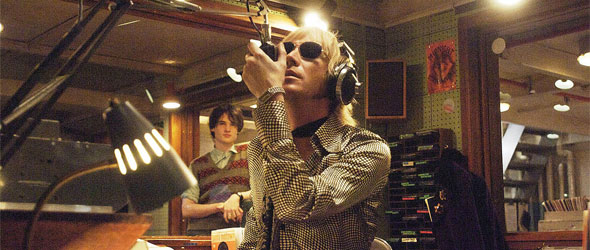Reviews
2012 (Columbia Pictures)

The Stab: A poor excuse for filmmaking lacking in virtually every department. Even sequences of grandiose Earthly devastation are dim and dull. With a two-and-a-half hour runtime, this isn’t a movie: it’s torture.
2012 is just as the ancient Mayans predicted: an earth-shattering, cataclysmic event unleashing untold horror and agony upon the entire human race. I hope my creative license to use hyperbole is appreciated, even if I won’t be using it here.
In the year 2012, solar flare storms bombard the Earth. The core melts, and the Earth’s crust begins to shift. Earthquakes, volcanic eruptions, and tsunamis abound, destroying the world as we know it.
The film alternates its focus between diplomatic preparations before the coming crisis, and one family’s struggle to survive the global disaster. One perspective is just as stupid as the other.
As patriarch of the fleeing family, John Cusack wears his embarrassment over associating with such an asinine project plainly on his face. His ex-wife and co-survivalist Amanda Peet strains and swoons like a grade school drama pupil reading Tennessee Williams. But even a grade school drama class is too prestigious a venue for comparison.
Director Roland Emmerich, responsible for such consummate cinematic achievements as Independence Day, The Day After Tomorrow, and 10,000 B.C., uses absolutely zero inspiration in crafting this film. His singular task is quite clear—to demolish our world using green screens and CGI effects—but he extrapolates none from this concept.
The story, the characters, the dialogue—they exist solely for the sake of convenience, to fill the chasms between pancaking skyscrapers and hurtling balls of lava, or to manufacture a sense of struggle and human compassion. Such little thought is given to the narrative, however, that it works about as well as the shiny side of duct tape.

Various suited figures read over ambiguous pieces of paper, their “Dear God!” reactions captured in face-framing close-ups. It’s laughable. John Cusack and family somehow manage to stay one step ahead of the widening fault line, or angle the plane just so that it passes between two collapsing buildings, or drive the camper across the churning Earth among fireballs falling from the sky. It’s preposterous.
Indeed, I repeatedly found myself having the polar opposite reaction to what was intended by the film. As characters shared in their fears or said their weepy goodbyes, I could not stifle my laughter. As chunks of coastline snapped off like wafer bars, and city streets were gobbled up by ocean, my eyes did not pop—they only rolled.
There’s really nothing here that hasn’t been covered before in other disaster flicks, including Emmerich’s very own The Day After Tomorrow. One scene features a cruise liner capsized and consumed by a giant wave. Its passengers dangle from railings and poles as the ship’s floors turn sideways. It recalls (or, more accurately, rips off) James Cameron’s Titanic. Though had Titanic’s passengers been aboard the 2012, they would have surely thrown themselves into the frigid seas below to ensure a fate of less suffering.
The idea of global catastrophe could breed intelligent commentary. How would humans react? What would our government do? How would we survive? Who would get to survive? The film has insipid answers to these questions and subverts any opportunity for legitimate—but no, I’m cutting myself off mid-sentence. Why should I put thought into a substantial critical analysis when the film itself is made with no substantial thought? I certainly wouldn’t critique a toddler’s finger paintings like they were a Rembrandt.

But let’s be real. No one was expecting Casablanca. At the very least, the large-scale destruction is well-staged and fascinating to watch, right? Wrong! These scenes are generic, repetitive, and stupefyingly mundane. I wanted to see the wonders of our world engulfed by Mother Nature’s fury. I wanted to watch the Eiffel Tower topple, London Bridge come falling down, the pyramids of Giza swallowed into the cracks of the Earth. We get so pathetically little of this. And even when an iconic structure perishes in the wakes of water and quakes, the camera cuts away too soon—often right before the “money shot” of complete annihilation.
The best reason to sit through the mind-numbing two-and-a-half hour running time of 2012 is to bolster your appreciation for true cinematic art. After watching this film, I realized the importance of independent filmmaking and strong artistic perspectives in film: to create something meaningful, beautiful, worthwhile (and to counteract, pardon my French, crap like this).
It’s also the perfect film for sadomasochists. Witness the decimation of billions of people, all while feeling like your brain is being pressed inside a hot waffle iron! Again, all exaggerations aside.
2012 is lame. 2012 is vapid. 2012 is atrocious. Not only is it far and away the worst film I’ve seen this year, but it’s one of the worst films I’ve seen in my life. Never before have I left a movie with a strong visceral urge to slap the director for such staggering incompetence. Mr. Emmerich, consider this my palm falling hard on your cheek. • a big, fat F (Rated PG-13 • 158 minutes too many)
Pirate Radio (Focus Features) *Adam’s Weekend Pick*

The Stab: An entertaining and colorful excursion aboard a rip-roaring radio boat. Though it lacks narrative fluidity, it has plenty of musical and comical vivacity—while its fully committed, top-notch cast keeps it afloat and on course.
As rock and roll echoed across our nation in the 1960s, the BBC kept to the classics during their broadcasts across the pond. Music lovers looking for slicker sounds on the Isles’ airwaves tuned in to rogue radio stations transmitting from seafaring ships.
Pirate Radio is one of these ships, anchored off the British coast in the North Sea, blasting the Beatles and spinning the Stones onto the mainland. The film creates a colorful and melodic atmosphere that perfectly captures the fringes of 1960s culture: the stuffy conservative aristocracy on one end, and the fancy-free liberation movement on the other.
The music throughout is fun and catchy, and various shots of people dancing—people of all shapes, colors, and walks of life—portrays the unifying power, the freedom that comes from letting go and letting loose. Settings, costumes, and character designs are simply spot-on.
The characters are uniformly quirky and entertaining, and the actors involved are excellent. Top honors go to Bill Nighy as Quentin, the radio boat’s stylish owner and captain, and the evermore versatile Philip Seymour Hoffman as reckless American deejay “The Count.” Nick Frost is strong as the dingy, doughy playboy Dave, and Emma Thompson also climbs aboard for a short but sturdy showing (in typical Emma Thompson fashion).

The magic of this movie comes from watching the antics and interactions between its outrageous cast of characters. As they partake in pointless and often preposterous activities, they are a joy to behold. The banter between them isn’t always the sharpest, but it’s more than enough for fizzy amusement.
Pirate Radio runs a bit aground when it progresses in plot. The film creates conflict as uptight British bureaucrats try to silence broadcasts from the boat. But their actions prove to be more of a nuisance than a legitimate threat. Part of the story focuses on the young Carl (Tom Sturridge) joining the ranks to level out his life (or so he claims). But his purpose progresses slowly, moreso providing a prudish prism for free-spirit frolics and a life of sex, drugs, and rock-and-roll. The final act steers in a surprisingly dire direction, which, while effective in selling suspense, further weakens narrative cohesion.
The film works best as a string of scenes, a set of vignettes aboard a boat that really rocked. It’s an entertaining romp to the very end, thanks in large part to its strong slate of actors. But the overall journey is inconsequential and a little haphazard.
Even so, Pirate Radio is a luscious tribute to swinging sixties pop culture. It makes a vibrant case for the collective capacities of music, and it definitely made me want to get up and dance. • B- (Rated R • 135 minutes)




Leave a Reply
You must be logged in to post a comment.